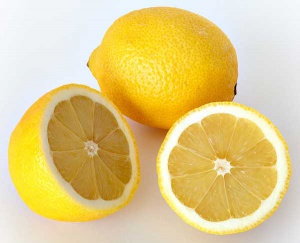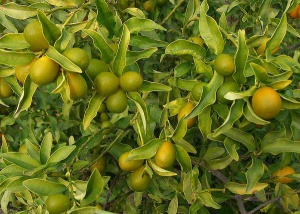Lemon
Contents
Description & Origin
Lemons are fruits which are power-packed with nutritional value and belong to the family rutaceae. They are oval in shape and yellow when mature, green when unripened. The scent of the Lemon is refreshing and the flavor tart. Although acidic in flavor, they leave alkaline residues in the body. The Lemon tree is native to Asia, but can be found growing in many tropical and subtropical regions of the world. The trees grow up to twenty feet tall, and produce fruit year-round. Each tree can produce over 500 lemons per year.
Actions & Nutrients
Lemons have anti-bacterial, diuretic and expectorant properties. Some of the vitamin and minerals found within the lemon and its rind are:
- Vitamin A
- Vitamin B1
- Vitamin B2
- Vitamin B5
- Vitamin B9 (folate)
- Niacin
- Calcium
- Iron
- Magnesium
- Phosphorus
- Potassium
- Vitamin P (bioflavonoids)
Medicinal Uses
Lemons are very effective in dislodging phlegm and mucus, they're beneficial in the treatment of the common cold, sore throat and cough. An effective anti-bacterial gargle can be made by mixing filtered hot water with Lemon. Hot tea with honey and Lemon will help open the sinuses and soothe the throat. They're known to strengthen blood vessels and are valuable for those suffering with high blood pressure. Scurvy, headache, nausea, heartburn, constipation and worm infestation are also remedied with the use of Lemons. Since they are low pH, they are excellent for the treatment of acidosis. Kidney and bladder disorders improve due to Lemon's diuretic values.
Many people have experienced numerous benefits from Lemons for mental and emotional health. Lemons are known as mood-enhancers. The fruit along with it's aroma can help to lift the spirit, calm anxiety and aid in areas of depression and memory.
Natural Beauty
Lemon juice is often used to lighten age or liver spots. It is very popular in cleansing the facial skin, exfoliating, and helping with problems such as acne and blackheads. Both men and women have used the juice of this fruit to lighten the color of their hair. It is also used to whiten teeth and freshen breath.
Culinary & Other Uses
Lemons have gained well-deserved popularity as their fresh tart flavor and delightful aroma compliment many culinary dishes and recipes. They are used to enhance the flavor of seafood, salads and vegetables. The outer rind (zest) can be grated and included in baked goods and pastries, for a unique "zing".
Many people use the juice of the Lemon to enhance the appearance of cut fruit, as it will stop the browning discoloration process. The citrus scent it possesses is cherished as a household deodorizer and cleanser. Lemon juice can be used to clean and disinfect wooden cutting boards, and has been proven to be an excellent grease-cutter.
Lemon oil has been effective as an insecticide and furniture polish. When combined with salt or baking soda, it will remove tarnish from brass, copper and stainless steel cookware.
Related Discussions
- Herbal Kitchen Remedies
- Lemon Juice Effective vs. Calcium Stones
- Will Vitamin C Prevent an Apple From Browning?
- Benefits of Citrus Fruits
- Lemon juice for earache/infection/wax questions

